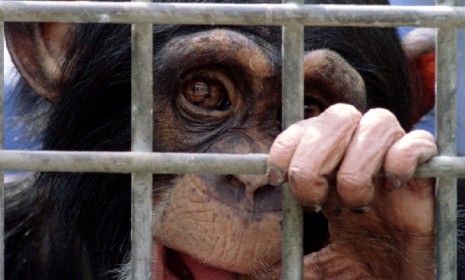Should we limit medical testing on chimps?
The Institute of Medicine finds most experimentation on chimpanzees to be "unnecessary" — putting the onus on science to adapt

A free daily email with the biggest news stories of the day – and the best features from TheWeek.com
You are now subscribed
Your newsletter sign-up was successful
Chimpanzees, thanks to a genetic makeup that closely resembles a human's, have long served as test subjects in the field of medical research. But after nine months of heated deliberation, a new report from the Institute of Medicine (the health arm of the National Academy of Sciences) finds that behavioral and medical testing on primates is largely "unnecessary" and should be limited to extraordinary circumstances. In what's seen as a victory for animal rights groups, the National Institute of Health promptly accepted the IOM's recommendations on Thursday, suspending all new grants supporting lab testing on primates — even though such research has proven critical for medical advances in the past. Here's what you should know:
Why do we test on chimps?
It's simple: The intelligent apes are man's closest relative. In 2005, for example, researchers mapped the chimp's entire genome, 99 percent of which was genetically similar to humans, says Dan Vergano at USA Today. This overlap lets scientists test vaccines and treatments for everything from malaria to hepatitis; in fact, testing on chimps helped "virtually" eradicate hepatitis B and C infections spread through blood infusions.
The Week
Escape your echo chamber. Get the facts behind the news, plus analysis from multiple perspectives.

Sign up for The Week's Free Newsletters
From our morning news briefing to a weekly Good News Newsletter, get the best of The Week delivered directly to your inbox.
From our morning news briefing to a weekly Good News Newsletter, get the best of The Week delivered directly to your inbox.
Why should we stop experimenting on chimps?
It seriously messes them up and has become increasingly taboo. The United States is one of only two countries in the world that still permits experimentation on the apes, "a species that exhibits clear signs of love, complex social organization, self-awareness and distress," says Melissa Healy at the Los Angeles Times. Recent studies demonstrate that depression is evident in 58 percent of retired lab chimpanzees, with 44 percent exhibiting symptoms of post-traumatic stress disorder — "afflictions virtually absent in wild populations."
Then what will we test instead?
The need to rely on chimps is "quickly being eroded," says Healy, as we develop new lab techniques and more powerful computers and learn how to engineer mice and rats to "mimic the human immune system." The testing of "tiny dosages of... biologic medicines" on humans is also becoming safer. However, these alternatives are not yet "widely available."
A free daily email with the biggest news stories of the day – and the best features from TheWeek.com
Would we stop testing on chimps altogether?
Not entirely. But the NIH's adoption suggests that this field of testing will eventually end, says James Gorman at the New York Times. The use of chimps has "already been waning," notes Gorman, in part because it's so expensive. For the time being, the recommendations establish "a set of rigorous criteria" for researchers proposing to use chimpanzees in biomedical or behavioral research. "Chimpanzees should not continue to suffer," argues Meredith Medoway at Policy Mic. "We must begin to invest in finding a new way to do research."
Sources: LA Times, NY Times, PBS, Policy Mic, USA Today


